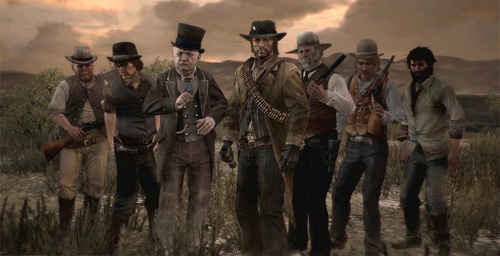We’ve talked about video game endings multiple times on this site, but I just had to bring the issue back up after reading an excellent article about today by Christian Higley over at Digital Hippo about How Video Games Fail to End.
In it, Higley explores the idea that many games fail at a very basic level of storytelling: narrative structure. While stories typically have a first, second and final act, most games end the game right after the second act, before the real conclusion can actually set in. Red Dead Redemption is one of the few games I can think of that actually gives gamers a third act (and does it to great effect), in that Marston is allowed to return home, and the player spends time winding the story down before its sad but powerful conclusion.
While that’s not a new argument, the writer goes a step further by pointing out that most games are even missing the first act, choosing instead to thrust players right into the second act. The more I thought about it, the more I realized how true it is: games typically begin at the “inciting incident”. It’s the equivalent of starting A New Hope at the very moment Luke’s aunt and uncle are killed. Or in many cases, even after that.
It’s interesting to think about the concept of narrative structure in games, and how few of them actually even give this any thought. It’s no wonder that so many stories feel disjointed, out of place or lacking any kind of long-term resonance. Most games simply don’t go anywhere.
I think part of this is due to the sad but true business of games in general. How many titles end with blatant sequel set ups, and replace real resolution with the next big hook? It’s becoming an increasing problem, and more game creators need to take notice from the film industry to see how to successfully tie off one narrative thread while still leaving room for another.
So what do you guys think about this? Do games fail at narrative structure? What do you think the cause of this is? Go!
Source – Digital Hippos


I think one of the major problems is that game developers, project leads, and even the writers often don’t consider story to be a big deal. I think it’s only more recently that games are starting to get really developed stories, but even then, they’re making games for a crowd who generally just want to shoot things and make them die. I don’t think that a lot of gamers really care about the story, and the developers see this and skip straight to the action with just enough plot to justify your ability to mass-murder.
Games are starting to develop better plots, though, and I think with that you’ll see more 1st and Final acts. Even the Call of Duty games had some set up and some conclusion, but I think that most of the games that do often just have them as cut scenes, whereas in Red Dead Redemption you really played through to the end. SPOILER ALERT: Also, the story doesn’t end with John, as Jack there’s a new special quest that you can get where you avenge your father’s death, and that’s REALLY the end. End of Spoilers .
In the end I think its that the developer needs to get their gamer hooked at the beginning of the game and a lack of attention span to have a more “boring” or “slow” ending – gamers like to see a big explosion as their finale over teaching their kid to shoot a gun for the most part.
Maybe we’ll see some bitchin’ stories this year with LA Noire, that looks to be very plot-driven.
I would agree that they fail at endings. This is due mainly to them needing to make money. Almost every modern game in my memory ends with “OH SHIT THIS IS GETTING SERIOUS BUY THE NEXT ONE” which is fine in a more trilogy standard setpiece but not very good if it is the games first outing. Even established trilogies end sometimes with more questions than answers, such as Halo’s trilogy.